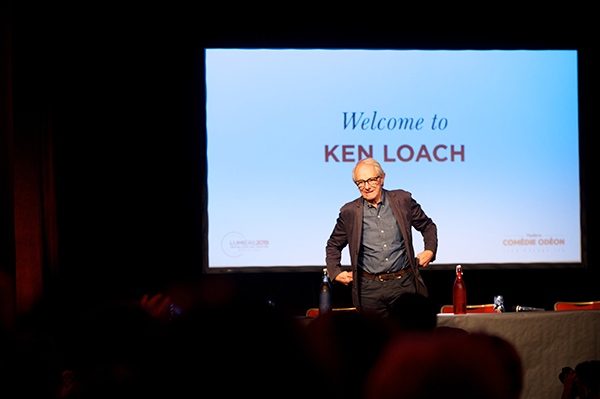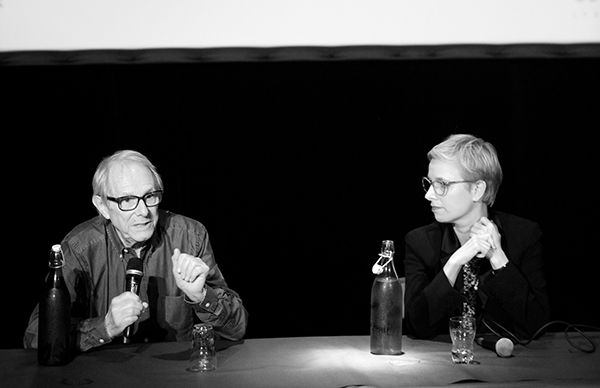Ken Loach :
Let’s fight together
PostED ON OCTOBER 17 AT 5PM
Arriving in Lyon by second class train according to his wishes, Ken Loach said he was moved yesterday to meet the audience of the Lumière festival. The committed filmmaker never gives up. His Master Class took the form of a dialogue with the deputy of “France Insoumise” (“Unsubmissive France” an eco-socialist political party), Clémentine Autain.

Copyright Institut Lumière / Loïc Benoit
Ken Loach :
Today’s world is dangerous. Extremists will benefit, because when we can see the world crumbling all around us, the far right always takes advantage. It is more important than ever to fight on all fronts and above all, to understand what is happening, where it comes from, because false solutions occur when we don’t try to understand. We need to fight this insecurity, together, perhaps also through the cinema.
Films should respect the complexity of life, celebrate friendship, joy, tenderness, address our resentments; otherwise it won’t work. Movies should talk about love, about everything that touches us, about everyday life, not just about fighting. There is an almost umbilical connection between our social situation and our private life.
Clémentine Autain : Sorry We Missed You had a huge impact on me, this film that is like a sequel to I, Daniel Blake in terms of the rawness of what it manages to depict. It forces us to think about the objectification of Uberisation, showing us how a dream of independence can turn into a real nightmare for the family. The kids, who are no longer cared for, isolate themselves, and it affects the parents’ relationship - when we cannot take care of ourselves, we can no longer take care of anybody. This film stirs up anger within us.
Ken Loach : While screenwriter Paul Laverty and I were at a food bank, scouting locations for I, Daniel Blake, we realized that there were not just unemployed people in these places, but people who don’t have enough to eat, or who buy very low-priced food for their children and not for themselves. We found out that two-thirds of the new jobs in recent years, more than 60%, are precarious. This situation traces its source back to Margaret Thatcher, when she reduced the trade unions. It gave the go-ahead to employers to set off this situation we know of today. Work is like a faucet now, either they open it, or they close it.

Copyright Institut Lumière / Loïc Benoit
Clémentine Autain : These ultra-free market policies launched by Margaret Thatcher are still models that increase social control. We are not quite at the same stage as the separation of England from the EU, but I would like to point out one important thing: the atomization of workers. In the past, we had a place of socialisation at work, a unified place. But, as we see in Sorry We Missed You, if you do not want to do a job, your colleague will. We must find other places of socialisation and other forms of hope. The challenge is to federate, to talk to each other and to knock down the walls that have been put up.
Ken Loach : Brexit is a diversion, because the big problems we have were already there when we were in the European Union, and they will still be there when we leave. And it will be even worse if Boris Johnson remains prime minister. We have a strike in London every minute, activists are all seeking to find ways to combat this precariousness. But we never hear about these strikes. The media doesn’t relay the information. We must improve our communication, because when we are divided, we are weak. Things need to change structurally. The BBC is controlled by the government, the press belongs to international conglomerates. Labour Party leader Jeremy Corbyn has been accused of racism, whereas he is a man of absolute integrity. But the media reports this. That's how far the campaign goes to prevent the victory of the left. If Corbyn wins, every worker will have rights stipulated in his or her contract and will be entitled to social security. Public money will be invested directly in green energy, everything will be regenerated.
A football team can represent the hope and identity of a community. People meet, share a drink and it's a big unifying force, all thanks to football. We are now owners of the Bath Club (where Ken Loach lives) and it's a great feeling. It's a beautiful metaphor for socialism.
Charlotte Pavard

